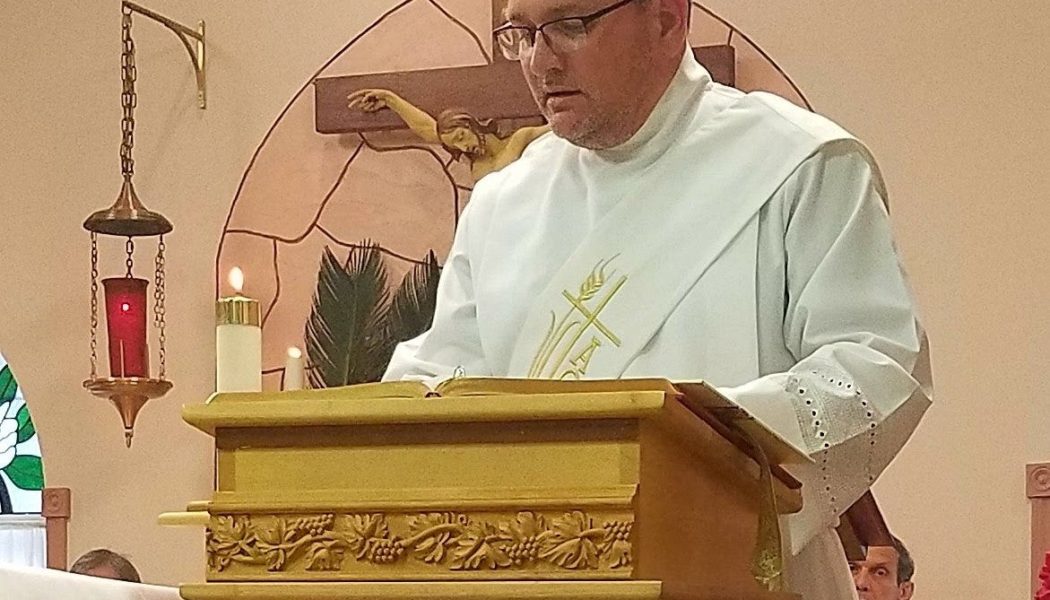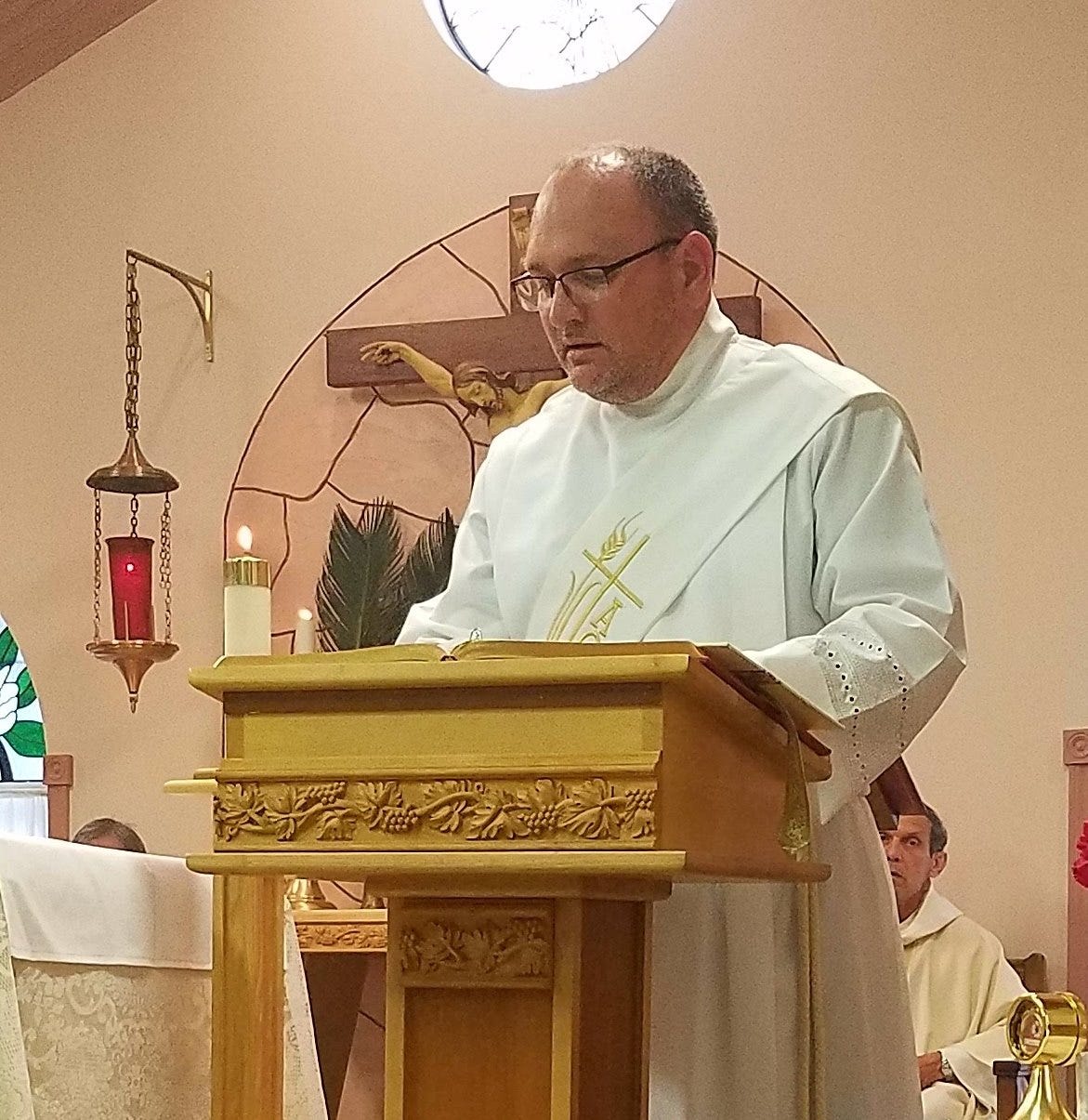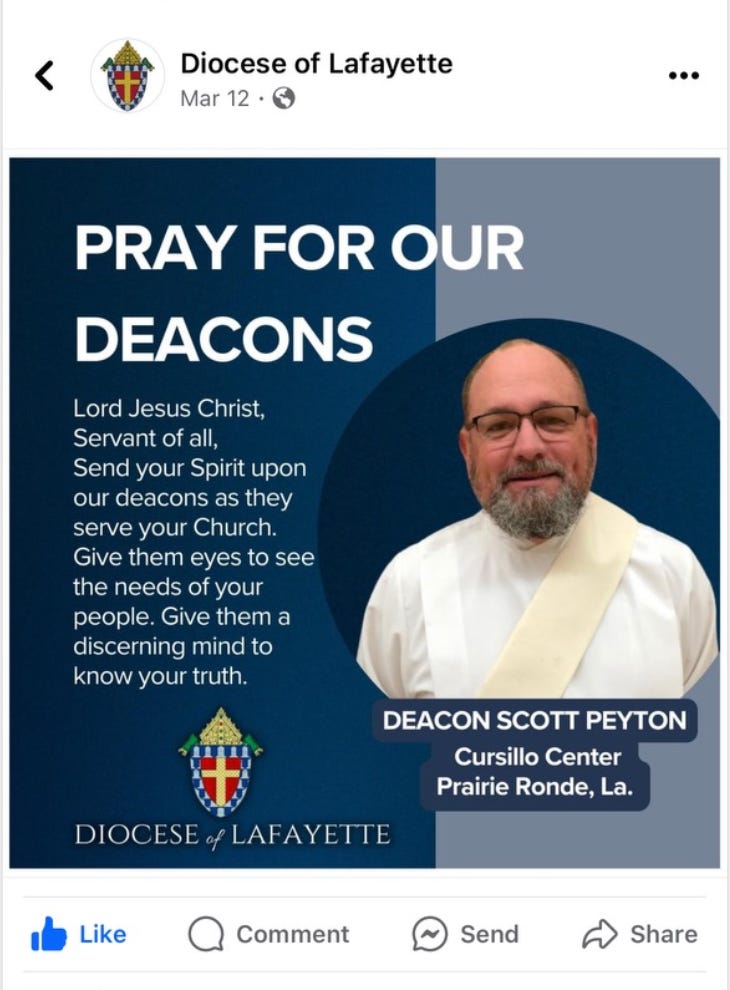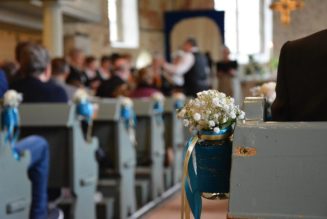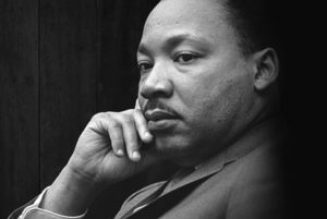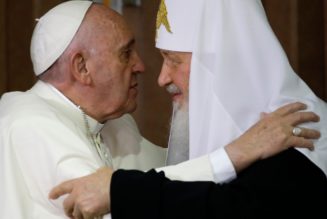Pillar subscribers can listen to this analysis here: The Pillar TL;DR
A Louisiana deacon declared excommunicated this month had formally joined an Anglican parish community, before his bishop declared that he had incurred a formal canonical penalty.
Deacon Scott Peyton’s excommunication has garnered national attention, because the deacon’s defection from the Church came after his son was abused by a priest.
The excommunication itself has been framed in local media reports as a direct response to the deacon’s criticism of diocesan policies and approaches to sexual abuse allegations.
But while that framing does not seem supported by available information, the case raises questions about episcopal decision-making, and transparency, in a gravely difficult pastoral circumstance.
—
In 2015, Deacon Scott Peyton’s 16-year-old son was molested by Fr. Michael Guidry, a priest of the Diocese of Lafayette Louisiana, where Deacon Scott is incardinated.
Guidry was convicted of plying Peyton’s son with alcohol and sexually assaulting him after the boy passed out. During depositions in a lawsuit, the priest claimed that the boy had seduced him, and that he had only supplied alcohol to teach the boy to drink responsibly.
The priest was convicted in 2019, and sentenced to prison. While the diocese said the priest is permanently barred from ministry, Guidry has not yet been laicized. It is not clear whether a penal case has been sent to Rome as required by canon law — which, according to typical diocesan practice in the U.S., ordinarily takes place after criminal trials and civil litigation is concluded.
And the past few years have been difficult for Deacon Peyton and his entire family.
The family sued the diocese for damages, reaching a $350,000 settlement in April 2021, with the diocese issuing a public apology to Peyton’s family.
The lawsuit was draining, Peyton said.
Still, “we continued trying to go to the Catholic Church, but I took a leave of about 18 months from active ministry,” he added.
“All of this had been a battle back and forth,” he said, “to deal with the hypocrisy of the diocese and the Church, and knowing as a deacon so much of how things worked. Especially seeing the Church’s lobbyists being so active at the legislature to go against bills that would extend the statute of limitations for victims.”
“It came to a point where I should have left the Church a long time ago. … The institution and the men that are clergy were kind of standing between me and my faith. In addition to losing faith in the institution of the Church, [those men] were beginning to erode our family’s faith in Christ,” Peyton told The Pillar.
Eventually, though, Peyton thought a new assignment would help. He got involved in diocesan Cursillo ministry as a deacon.
But in early December 2023, four years after his son’s abuser had been sent to prison, Peyton told Bishop Douglas Deshotel that the trauma had become too much.
“Over the past few years, the Catholic Church has been confronted with a series of distressing revelations regarding sexual abuse scandals involving members of the clergy. The magnitude of these revelations has deeply shaken my faith and trust in the institution to which I have dedicated a significant portion of my life,” he wrote in a Dec. 4 email to the bishop and obtained by The Pillar.
“The pain and suffering endured by the victims, our family, and most importantly our son, coupled with what appears to be a systemic failure in addressing and preventing such heinous acts, have left me disillusioned and unable to reconcile my commitment to the Church with my conscience.”
The deacon said he had decided to leave his diaconal ministry, and the Church.
“I believe that stepping away from my role as a deacon and disassociating myself from the Catholic Church is the only ethical choice I can make at this juncture,” he wrote.
“This decision is not a rejection of my faith in God or my commitment to living a life guided by Christian principles. Instead, it reflects a conscientious objection to the way the Church has handled cases of sexual abuse, and a desire to distance myself from an institution that, currently, falls short of the values that it professes.”
The day after he sent that email, Bishop Deshotel replied in an email obtained by The Pillar, telling Peyton that he was “sad to receive your email deciding to leave the Church and cease to exercise your vocation as a deacon.”
The bishop promised prayers and Masses for the deacon’s intentions, and urged him to be “open to the gift of faith in the Catholic Church founded by Jesus Christ and built on the Apostles.”
But despite those prayers, Peyton and his family enrolled in Trinity Anglican Church in South Lafayette, Louisiana this January. Peyton said they kept that decision quiet, aiming not to cause a controversy.
“We truly were trying to find a place that we can go and worship and rebuild our faith in Christ. That relationship has been damaged and we’re trying to rebuild that,” he told The Pillar.
“It’s an hour from where we live, but we were trying to go somewhere where people don’t know us beforehand,” he added.
Peyton told The Pillar that he didn’t inform the Lafayette diocese of his joining an Anglican parish. And he said the next time he heard from his diocese at all was when he was featured on a March 12 diocesan Facebook post, a regular posting urging prayer for clerics in the diocese.
Peyton said he didn’t comment on or share the post immediately, though he eventually posted on Facebook a note sharing that he and his family had joined an Anglican church.
But the diocesan post likely triggered some internal discussion, because Peyton soon after received a decree in the mail dated March 13, which declared that he was canonically irregular for the exercise of his sacred orders, and that he had incurred a latae sententiae excommunication, “by virtue of canon 1364 §1, and your written decision … to ‘sever’ ties with the Catholic Church.”
“The censures of the church are intended to be medicinal, perhaps as much for those who impose them as for those who are subject to them. It is with this objective that I mournfully must declare them,” Bishop Deshotel wrote.
The decree has attracted widespread attention, with many Catholics asking why a cleric can be excommunicated for joining an Anglican church, but not for abusing a minor.
Indeed, it is not the case that sexual abuse carries the penalty of excommunication in canon law — largely because excommunication is usually reserved for situations of an ongoing nature, and meant to prompt a conversion or a change of situation, whereas the penalties associated with child abuse are considered “expiatory” in nature — that is, they are meant, quite simply to punish.
There are exceptions to that general schema, and some argue that abuse should be among them.
But regardless of the legal praxis, popular perception about the purpose of excommunication usually misses the mark: while the penalty is often regarded as the gravest penal sanction the Church can impose — as a kind of official ecclesiastical shunning, or even a condemnation to damnation. But excommunication is not meant that way — especially because it is ordinarily revoked as soon as an excommunicated person expresses contrition, and changes the offending situation.
Expiatory penalties, like laicization, don’t work like that — they’re meant to be a lasting penalty, not just to provoke contrition, but to restore justice and repair scandal.
For that reason, the Church’s legal system has stiffened expiatory penalties for various kinds of abuse in recent years, even while the Church’s legal system on the whole is moving away from the use of latae sententiae penalties, including latae sententiae excommunication, in part because of the complications involved in imposing and declaring them.
Nevertheless, the excommunication of Deacon Peyton in Louisiana has prompted some discussion in recent days among canon lawyers.
Many canonists note that, in principle, it is not especially surprising that a cleric who formally joined a non-Catholic ecclesial communion would be subject to a decree of excommunication. Few would dispute a bishop’s prerogative to declare the act of joining an Anglican church as an act of schism, which brings with it the penalty of excommunication — meant, again, to urge the cleric to return to the practice of the faith.
Many would argue even that the bishop even has an obligation to eventually issue a decree to that effect.
But canonists have also noted that there seems to have been very little communication between Deshotel and his deacon which might constitute a warning or an opportunity for due process — that while an entire penal trial is not required to declare a latae sententiae penalty, available correspondence from the Lafayette diocese gives no indication that Deshotel urged his deacon to clarify his intention in worshiping at an Anglican church, or to reconsider his decision.
In short, several canonists have noted in private conversation with The Pillar that Bishop Deshotel’s decision to declare an excommunication seems to have come faster than they would have expected, especially given the grave stresses Peyton’s family has faced.
Some canonist point to the Church’s canon 1344, which notes that when the law establishes a clear penalty for some act, imposing it can be deferred, “if it is foreseen that greater evils may arise from a too hasty punishment of the offender, unless there is an urgent need to repair scandal.”
Indeed, while it seems obvious that a bishop would need to make some public statement about whether Deacon Peyton was still in public ministry, a trauma-informed and pastorally aware approach might have recognized the psychological factors that parents of a child abused by a cleric must sort through, and given evidence of both pastoral and juridic sensitivity to them.
Of course, much of the discussion about what the Lafayette bishop did is speculative, and informed by limited information. There may have been other factors impacting Deshotel’s decision, or other elements of the communication between him and his deacon, which have not yet come to light
But while the issue of Peyton’s excommunication has become a source of concern and confusion to abuse victims and their advocates, the Diocese of Lafayette has declined to answer questions, either from The Pillar or from other media outlets.
Whatever Deshotel’s reasoning, he’s not planning to come forward with it, or to offer additional information or clarity regarding the situation. Some sources close to the diocese say the bishop is concerned about “feeding the press,” and therefore not eager to offer his sense of the decision.
In short, Deshotel might be hoping that not “feeding the press” will make the story go away — and he’s likely right. After Holy Week and Easter, the story will likely fall out of the headlines, regardless of whether the bishop responds to questions. And in institutional ecclesiastical culture, outwaiting a problem story is not a controversial or unusual response. In many chanceries, it has been long the case that when bishops face pushback against some story, they blame the media for not having all the facts, even when they’re unwilling to supply them.
But concerns about due process, transparent communications, and trauma-informed leadership won’t soon go away. In fact, for many Catholics, this story will contribute to their longstanding concerns about those issues.
For those Catholics, diminished trust in ecclesiastical decision-making is the story of the contemporary era in the Church’s life. While cases like that of Fr. Marko Rupnik loom large in the headlines, a growing number of clerics say they’re concerned about the ways their own bishops might handle difficult and serious circumstances. Many lay people seem in the same boat.
That’s exactly the reason why Deshotel hasn’t been given the benefit of the doubt in a decidedly hard canonical case — whatever the unknown factors or nuance of his decision-making.
And unlike the story of the day, those issues won’t soon fall from public consciousness.
They point to an ongoing trust gap between bishops and the people they’re appointed to lead. That gap is a big part of the reason the Peyton story has garnered so much attention — amid ongoing scandals like Rupnik and McCarrick, many Catholics are disinclined to assume that bishops have acted rightly in complex circumstances.
Having seen both diocesan and the Holy See mishandle cases and mistreat victims, many Catholics — many sincerely and earnestly practicing the faith — are willing to believe that’s the case as a matter of default.
Of course, bishops themselves are in the position to address that. They can do so largely through as much candid and direct clarity about their decision-making as they can muster, through reasonable responses to reasonably asked questions, and through a willingness to hear Catholics when a decision provokes controversy.
Some diocesan bishops, especially in the wake of the 2018 scandals, have taken up the challenge of that culture change — not only because they view it as a matter of justice, but because they’ve recognized that since 2018, lay Catholics have a different set of expectations regarding public accountability, and responding to that is a matter of restoring the Church’s public credibility.
But in Lafayette, that approach does not yet seem to be the order of the day.
Comments 28
Services Marketplace – Listings, Bookings & Reviews
